Say: “Truth has come and falsehood has vanished.
Falsehood is always bound to vanish.”
(Qur’an, 17:81)
 |
There is another idea that we must examine together with that of terror; that is, the phenomenon of radicalism.
Radicalism means supporting sudden revolutionary destructive changes in any sphere and applying a strict uncompromising policy in order to achieve them. Radicals are characterised by their desire for revolutionary change and the stern, sometimes aggressive attitude they adopt.
In this, as in every sphere of life, the guide for the Muslim is the verses of the Qur’an and the life of our Prophet Muhammad (pbuh). When we look at radicalism in the light of the Qur’an, we see that it has nothing to do with the way in which God commands the believers to behave. When God describes a believer in the Qur’an, He depicts him as a loving, soft-spoken person, shunning conflicts and arguments, approaching even the most hostile people with warmth and friendship.
An example to guide us in this matter is the command given by God to the Prophet Moses (pbuh) and Aaron (pbuh) to go to the Pharaoh and speak gently to him:
Go to Pharaoh; he has overstepped the bounds. But speak to him with gentle words so that hopefully he will pay heed or show some fear. (Qur’an, 20:43-44)
 |
Pharaoh was one of the most cruel and rebellious unbelievers of his time. He was a despot who denied God and ignorantly worshipped idols; moreover, he subjected believers (the Israelites of the time) to terrible cruelties and murder. But God commanded His prophets to go to such a hostile man and speak to him gently.
You will notice that the way shown by God was the way of friendly dialogue, not the way of conflict with sharp words, angry slogans and agitated protests.
 |
There are a few other examples to show Muslims how to behave in the dialogue between the Prophet Jethro (pbuh) and the deniers. This dialogue is related in the Qur’an in this way:
And to Madyan their brother Jethro. He said, “My people, worship God! You have no deity apart from Him. Do not give short measure and short weight. I see you prospering and I fear for you the punishment of an all-encompassing Day.
My people! Give full measure and full weight with justice; do not diminish people’s goods; and do not go about the earth, corrupting it.
What endures with God is better for you if you are believers. I am not set over you as your keeper.”
They said, “Jethro, do your prayers instruct you that we should abandon what our fathers worshipped or stop doing whatever we want to with our wealth? Yet you are such a lenient, normal person!”
He said, “My people! What do you think? If I do possess a Clear Sign from my Lord and He has given me His good provision, I do not want to oppose you in what way I am forbidding you. I only want to put things right as far as I can. My success is with God alone. I have put my trust in Him and I turn to Him.” (Qur’an, 11:84-88)
When we examine what he says, we see that the Prophet Jethro (pbuh) invited the people to believe in God and to adopt high moral principals and he did this with friendliness and humility. We can explain some of the reasons behind the things said in these verses:
 |
◉ When the Prophet Jethro says “I am not set over you as your keeper” to the people, he does not want to dominate them; his only intention is to inform them of the truth that God has revealed.
◉ “You are clearly the forbearing, the rightly-guided”: These words of the deniers to the Prophet Jethro show his warm, gentle and courteous character and that this was particularly appreciated by the deniers.
◉ “My people! What do you think?” This expression used by the Prophet Jethro shows that he calls on the deniers to use their intelligence and conscience. In other words, he does not use insistent pressure, but questions their ideas from an opposing stance and invites them to consider and come to a conclusion based on their own free conscience.
◉ “I do not want to oppose you in what way I am forbidding you”. The Prophet Jethro’s prohibition here is not actually a prohibition. He explains that some acts are sinful and invites the people to abandon them. Moreover, when the Prophet Jethro says “I do not want to oppose you”, it is not his purpose to dispute with the people; he does not want to make them uncomfortable and incite a quarrel; he wants only to invite them to faith and the practice of high moral principles.
 |
If you examine the Qur’an you will see that a warm, gentle and compassionate disposition characterised all the prophets. God reveals that the Prophet Abraham (pbuh) was “tender-hearted and forbearing.” (Qur’an, 9:114) and in another verse, the Prophet Muhammad’s (pbuh) moral principles are described in this way:
It is a mercy from God that you were gentle with them. If you had been rough or hard of heart, they would have scattered from around you. So pardon them and ask forgiveness for them, and consult with them about the matter. Then when you have reached a firm decision, put your trust in God. God loves those who put their trust in Him. (Qur’an, 3:159)
An obvious characteristic of radicalism is its anger. This disposition can be clearly seen in the speeches, writings and demonstrations of radicals. However, anger is not an attribute of Muslims. When God describes believers in the Qur’an, He describes, “those who give in times of both ease and hardship, those who control their rage and pardon other people – God loves the good-doers” (Qur’an, 3:134).
There is no situation in which a Muslim displays anger. Every Muslim of course wants other people to believe in God and live according to moral principles, but this is possible only by the grace of God. No matter what we do, no matter how much we try to explain the truth to people, human hearts are in God’s hands. God reminds Muslims of this very important fact in this verse, “... Do those who believe not know that if God had wanted to He could have guided all mankind? ...” (Qur’an, 13:31)
 |
 |
Therefore, it is the duty of a Muslim only to explain the facts and to invite people to accept them. Whether or not people accept the invitation is completely up to their own conscience. God reveals this truth in the Qur’an when He says that there is no compulsion in religion.
There is no compulsion in religion. True guidance has become clearly distinct from error. Anyone who rejects false deities and has belief in God has grasped the Firmest Handhold, which will never give way. God is All-Hearing, All-Knowing. (Qur’an, 2:256)
Therefore, there is no coercion to make people believe and become Muslims, or to make Muslims perform prayers and beware of sin. There is only advice. God reveals in a few verses addressed to the Messenger of God (pbuh) that Muslims are not oppressors:
We know best what they say. You are not a dictator over them. So remind, with the Qur’an, whoever fears My Threat. (Qur’an, 50:45)
Say: “Mankind! The truth has come to you from your Lord. Whoever is guided is only guided for his own good. Whoever is misguided is only misguided to his detriment. I have not been set over you as a guardian.” (Qur’an, 10:108)
Muslims are responsible only for explaining the religious morality, they apply no pressure or coercion on anyone and are enjoined to speak gently to even the most tyrannical deniers. Such persons cannot be radicals, because radicalism stands for the opposite of those qualities we have enumerated. Indeed, radicalism is an unIslamic current of thought and a political stance that came into the Islamic world from outside. When we examine social phenomena described in terms of radicalism, it will be seen that these are basically a collection of methods and pronouncements used by communists, or an expression of the “fanatical rage” that has no place in true Islam. (Qur’an, 48:26)
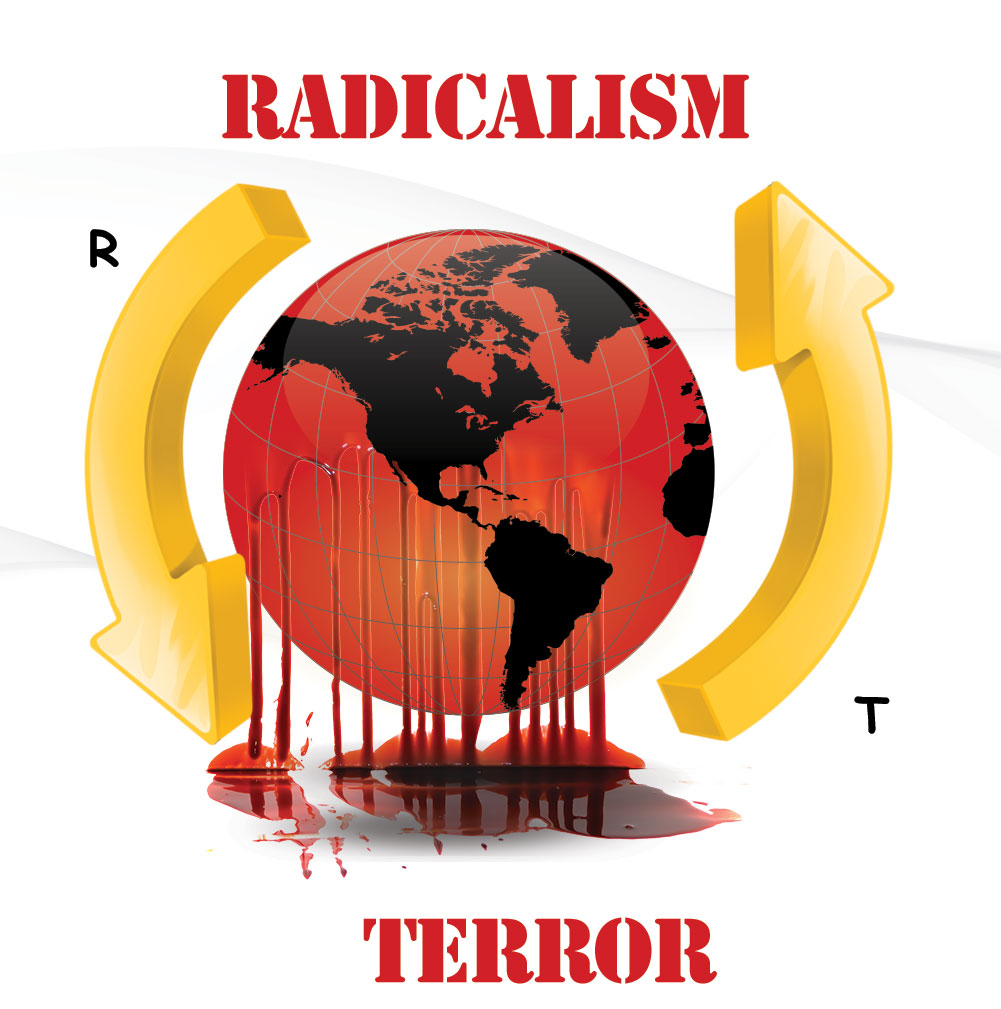 |
R. Radicalism |
As stated in earlier sections, one concrete fact stands after 13 years of military operations, from Afghanistan to Libya and from Nigeria to Iraq; radical terrorist groups have not ceased to exist through military force, violence and oppression, and to the contrary, they’ve grown even stronger.
What is more, all kinds of military operations, including air strikes and ground operations just lead to more civilian deaths, damage cities and destroy infrastructure, resulting in mounting fury in the countries concerned and that fury mostly benefits radical organisations. Spending billions of dollars on producing people opposing it, and thus providing human resources for terror organisations, is a most undesirable state of affairs.
Although killing off the leaders of terror organisations is presented as an effective technique by some military analysts, looked at from a wider perspective, no results are actually obtained from it at all. The killing of Osama bin Laden obviously did not spell the end of al-Qaeda.
Besides, terror organisations are capable of skilfully turning even these armed attacks against them into propaganda. They have the skills to portray the attacks against them as evidence of the righteous nature of their cause. For that reason, organisations either grow stronger or continue their activities underground and that makes the military struggle against them ineffective.
In order to break the spiral of terror, socioeconomic improvements need to be made and policies such as ensuring the implementation of democratic processes clearly need to be brought to the fore in regions where there are intense terrorist activities. In order for all these things to happen, however, it is essential to remove the ignorance that lie at the roots of all the errors of a radical mindset. The way to do that is through educational and cultural activities. Correct education with accurate ideas needs to be implemented, this would be far more economical than spending trillions of dollars on weaponry and later spending billions more on humanitarian aid, and is a method that will produce infinitely better results.
It is possible to stop these militants before they turn into killers through precautions taken against the intellectual foundations of these organisations. Moreover, it would then be possible to prevent new recruitment to those organisations. No terror organisation could ever resist such an intellectual struggle via television and radio and the internet. A movement that loses its intellectual basis cannot survive. The states should either take over this task or support non-governmental organisations that make themselves available for this task.
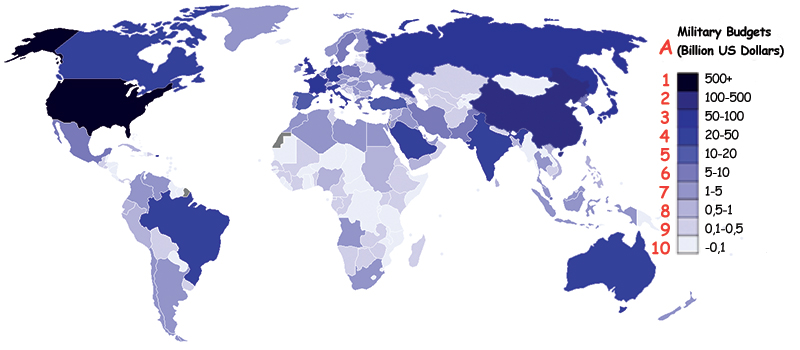 |
A. Military Budgets (Billion $ US Dollars) |
The world states pour money into fighting extremism with armed force; yet this menace keeps growing. An educational mobilisation against terrorist organisations is what it will take to prevent the outrageous terror all over the world. |
An educational mobilisation against all terrorist organisations, no matter what their ideological roots are, is what it will take to prevent the outrageous terror we encounter all over the world.
NATO keeps pouring money into fighting extremism with armed force; yet why does this menace keep growing? The answer is in the direction the finances are being directed. Trying to fight an extremist ideology solely with physical force will do little but increase the number of the supporters of that ideology. As the military campaign in the region costs more innocent human lives, the relatives and the close circle of those who died in those attacks will be motivated to join the extremists due to their resentments toward the West.
Such dangerous movements must be brought to an end and their ideological basis should be annihilated all over the world. As a matter of fact, this is something that can only be done by the Middle Eastern nations with the help of their Western allies. In that regard, in order to eradicate radicalism and its effects globally, and to uphold the positive ideals of humanity such as democracy, pluralism and human rights, education is the most important step. To prevent the proliferation of radicalism – a major threat against global security – world leaders should realize the urgent need for an intellectual campaign and seek ways to correct ignorance with intellectual efforts.
 |
THE TRUE COST OF MILITARY EQUIPMENT SPENDING |
The U.S. military budget increased by 104% over 11 consecutive years. Expenditure of $354 billion in 2001 rose to $721 billion by 2011. The money spent on the military could be invested in health and education instead, and employment opportunities could be employed for thousands of people. These two pages show some examples of how military spending could have been employed in other fields. |
One of the most horrid acts of radical terrorism that we have been describing in this book is no doubt the murder of 12 staff of the satirical magazine Charlie Hebdo in Paris. After this attack, synagogues, mosques, Islamic organisations, kosher stores and graveyards have also been under threat. The attack on a meeting held in Denmark to commemorate the Charlie Hebdo staff highlighted the severity of the situation one more time.
A vicious circle of hatred seems to have formed and this cycle hurts the ordinary, innocent people the most. The radicals of every philosophy have the potential to make Europe uninhabitable for everyone and mostly for minorities like Muslims and Jews. Terrorism, anarchy and violence are therefore the biggest problems of this century. The Islamic world in particular is suffering the most from this affliction. However, we have to reiterate yet again that terrorism has no religion.
Terrorism and violence are the inevitable results of an education system that believes human beings are mere animals fighting for their lives in a cruel setting; this system teaches people cruelty, selfishness and mercilessness. In this system, altruism, cooperation, compassion and love are not valuable. A human becomes strong only if he is cruel and selfish. When a spiritually weak person is educated like this and especially if he doesn’t know how to use his conscience, he will be easily swayed by any ideology that sees “violence as a means to prove himself and to obtain his rights.” To sum it up, a person who is trained with such education can be convinced to adopt the ways of terrorists, sometimes through communist principles and sometimes through radical influences which pose as Islamic. For this reason, the first measure the world needs to take against terrorism is fixing this wrong education system.
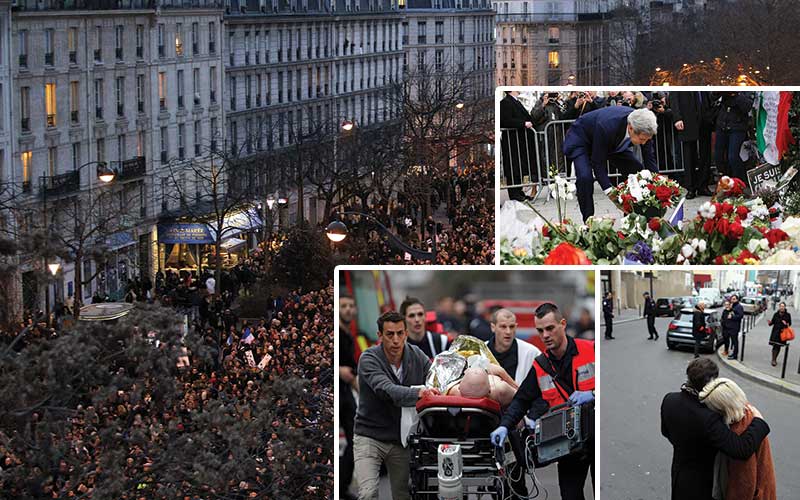 |
A vicious circle of hatred seems to have formed and this cycle hurts the ordinary, innocent people the most. |
It is true that content of Charlie Hebdo and other similar publications offend Muslims. This magazine published content that offended not only Muslims, but also Christians, Jews, Buddhists and many other people. However, what a Muslim should do in the face of such a situation is resorting to legal recourses, to ask that his values are not offended. Better yet, he can approach the offenders (or those with similar ideas) in a friendly manner and explain to them - kindly - that their attitude is not nice, that humour can be made in a more elegant style, and encourage them to adopt a more loving and compassionate attitude instead. They can write and talk about the fact that such wrong ideas should be fixed and let the whole world know about these facts. However, a Qur’an-abiding Muslim can never kill another person simply because the other person doesn’t follow Islam.
On the other hand, all around the world, murders are being committed and brutal acts are carried out in the name of Islam and the victims of these horrible acts are most typically Muslims. Scores of Muslims lose their lives everyday as a result of terrorist attacks carried out around the world.
It should be kept in mind that what these people live is not an Islam based on the Qur’an, but radicalism. The radicalism that emerged after the passing of the Prophet Muhammad (pbuh) has produced rules that are non-existent in religion and, using the name of God and the Prophet (pbuh), created a whole new religion. This system that developed based on fabricated hadiths has no room for love, compassion, friendship, respect for women, peace, beauty, art or science; in other words, for the things that bring joy to people. There is only room for oppression, coercion, cruelty and violence. The radical system virtually seeks to bury people alive and takes away everything beautiful using the name of Islam.
 |
The content of Charlie Hebdo and other similar publications have offended Muslims. However, what a Muslim should do is resorting to legal recourses. Better yet, he can kindly explain to the offenders that humour can be made in a more elegant style, and encourage them to adopt a more loving and compassionate attitude instead. |
Therefore, it is of paramount importance that in the efforts to explain the fact that Islam is a religion of peace, their explanations must be based on the Qur’an. It is technically impossible for a person who defends a version of Islam that is full of the radicals’ superstitions, fabricated hadiths and accounts to talk about peace and love.
This truth provides guidance not only to Muslims but also to the Western world that wishes to stop terrorism: The way to stop the so-called Islamic terrorism is intellectually eradicating the ideas that feed it. As long as the radical state of mind persists, bombing the Muslim world with drones, sending troops, or killing terrorist leaders, retaliating to violence with more violence, will not end terrorism. On the contrary, it will fuel it and make it even a bigger monster. Anything that would exacerbate hatred and hostility should be carefully avoided and an environment of ideas rather than one of weapons should be built.
Let us reiterate: terror is unacceptable in any form. In particular, equating Islam, which regards the killing of one person as equivalent to the killing of all mankind, with terror is one of the most terrible tragedies of our century. However, terror will not disappear by holding protest marches on the streets, nor through condemnations by politicians, nor through simply repeating, “Islam is a religion of peace.” The fact that Islam is a religion of peace is in the Qur’an, and that fact needs to be proclaimed to the world, persistently and with full supporting evidence, through education. The Islamic world also needs to be purged of nonsense: Western support is of course important for that, but it is Muslims who need to do the job.
Experts on terrorism, intelligence agents, writers, editors and analysts in the West are constantly seeking the answer to one question: Why do people join radical organisations?
They come up with numerous theories; they talk about poor kids from city suburbs, about uneducated and ignorant people and about bored young people looking for adventure. Some describe this phenomenon as “the attractive force of utopian politics”, while others maintain that these people set out with the aim of “writing a story of their own”.
However, these theories have been largely shelved as it has gradually been realized that many such groups contain large numbers of wealthy people, people with careers, academics, doctors and engineers, and that many of their members hail from well-off backgrounds.
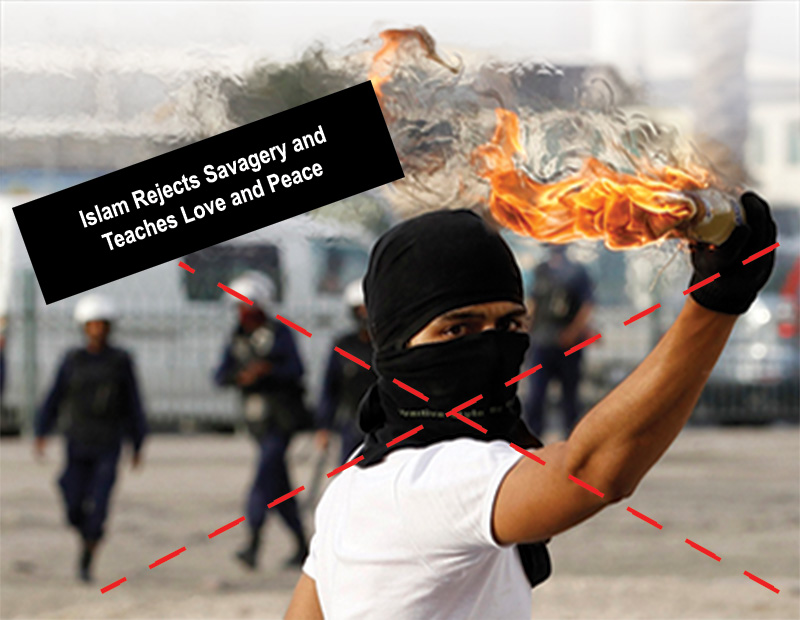 |
Some have declared that those who join such organisations have “mental problems”. The response to that came from John Horgan, a psychologist and a professor at the University of Massachusetts Lowell’s Center for Terrorism and Security Studies: “Because of what terrorists do, we assume that can be explained via the pathology of those people, but trying to explain terrorism as mental illness is misleading.”5
Horgan and others have had to eliminate all the possibilities they had hypothesized; neither poverty, nor boredom, nor mental illness can explain why people from almost every country in the world are so determined to overcome a good deal of difficulties to become part of a system in which people die and are killed with ease. Nobody would hurl himself into a war, leaving behind his family and all he owns for the sake of “writing a story”. He would never accept death so swiftly and unconditionally.
People are joining radical groups from all over the world, from European countries to Kazakhstan, from Australia to Somalia and from Russia to Tunisia. The number of people joining such groups is rising all the time. European countries such as France and Germany head the lists of these figures.
Let us now look at the true answer to the disturbing question: Turning away from the Qur’an and the true teachings of Islam and the consequent adoption of a skewed interpretation of Islam has led some Muslims to turn their backs on liberty, art and science and has radicalised them to a significant extent. As the ideological infrastructure of radicalism has spread in an uncontrolled manner (and sometimes in a manner controlled by certain covert forces) it has begun threatening a wide swath of territory, including Europe. The radicalism that ensued triggered Islamophobia, though the proponents of Islamophobia fail to see that they are further encouraging radicalism in a manner they never desired.
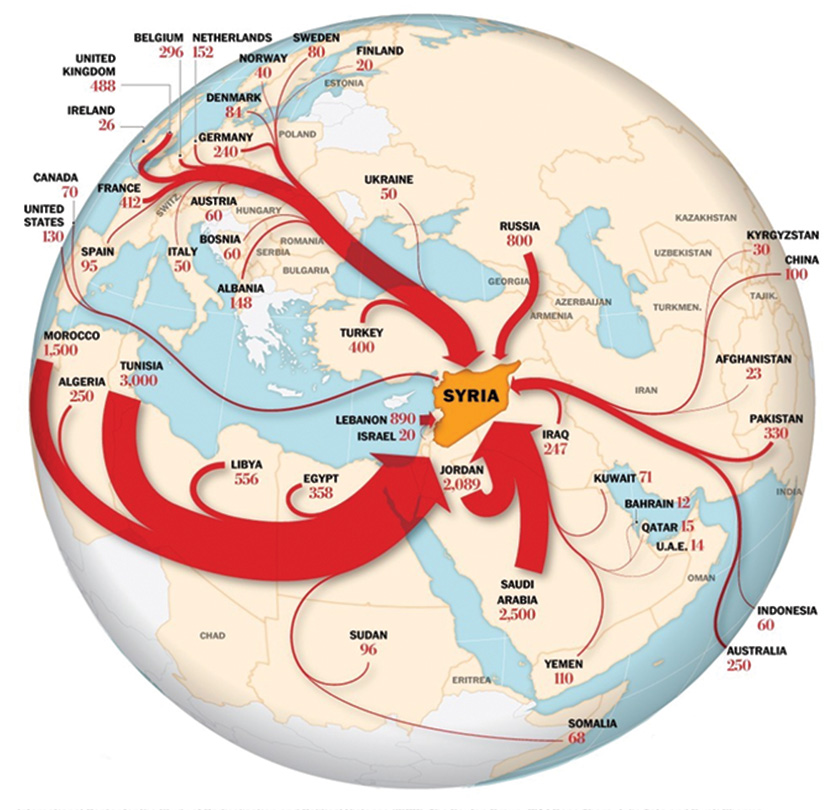 |
An estimated 15,000 fighters from at least 80 nations are believed to have entered Syria to help overthrow the regime of al-Assad. Europe at the moment is in a state of abject fear and paranoia over members of radical organisations that may return to their home countries and continue to commit acts of terror in their own countries. |
As the numbers of those seeking a solution in destroying Islam and Muslims, who do not want Muslims in their country and who sit back and watch the oppression of Muslims in the world has grown, this further serves to incite hatred. The horrifying images left behind by the coalition forces’ interventions in Afghanistan and Iraq were, for a good many, the final straw. Nobody could or did remain unmoved by the Western powers’ indiscriminate killing of families and destruction of homes. Savagery inevitably incites hatred.
The aim of the Western coalition may genuinely be to install its own version of democracy in these lands. Yet the method used is so wrong that it has harmed not just the Middle East, but the West itself. Those who wish to understand as to why so many people have joined radical groups from Europe and why suicide is such a major problem in the US Army need to take a profound look at the erroneous nature of the policies being followed.
So what should the solution be? Radical groups follow a deviant ideology that many people in the world believe to be true. The followers of that ideology cannot oppose the groups in question because, at heart, they simply do not believe that they are on the wrong path. This deep-rooted problem can only be resolved by the Islamic world completely renouncing sources based on nonsense and turning to the Qur’an instead, and the person who will bring that about is Hazrat Mahdi (pbuh).
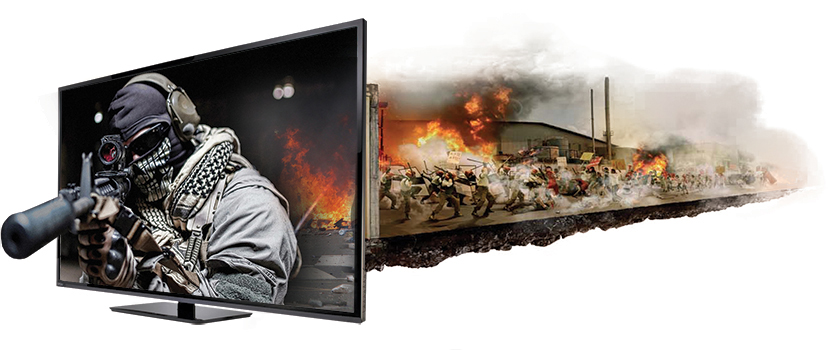 |
More than 1,000 foreign fighters are joining the fight in Syria each month. Even airstrikes do not seem to change this rate. The problem of radicalism can only be resolved by the Islamic world completely renouncing sources based on nonsense and turning to the Qur’an instead. |
Radical groups manage to produce this effect to a large extent by way of the internet. They employ social media with a mastery of persuasive propaganda. They reach out to five continents and gather supporters. They win people over with perhaps only a few brief lines. In other words, through education.
Horgan summarizes that effect in these words: “They have become so adept at social media that they are reaching out to disaffected individuals on a global scale.”
What needs to be done is to set out using the same means and to show people the false nature of that religion of superstition with evidence from the Qur'an by making use of such a powerful communication tool as the internet. It is to prove, using Islam's own holy book, that Islam rejects savagery and teaches love and peace. If the West can do that, there is of course no need to remind anyone that it has greater means at its disposal than the radical groups. Just imagine that all the international media, which are generally under the control of the West, were to provide such education with a loud voice! It would take mere seconds for the world to hear the truth.
Although the fear known as “Islamophobia” emerged across the globe in the wake of the September 11, 2001, attacks, its roots go back to the Crusades, or even earlier. Islam has now spread across the world: Muslims represent 6 percent of the population of Europe, more than 45 million. By 2050, Muslims are estimated to make up some 20 percent of the population and one in five people in Europe will be a Muslim—one of the main reasons for the rise in Islamophobia among Europeans in recent years.
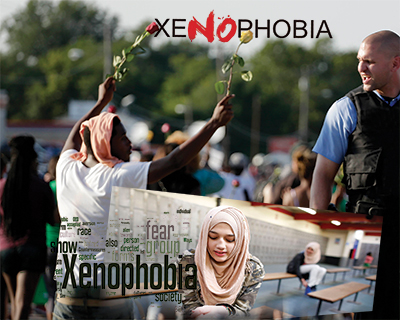 | 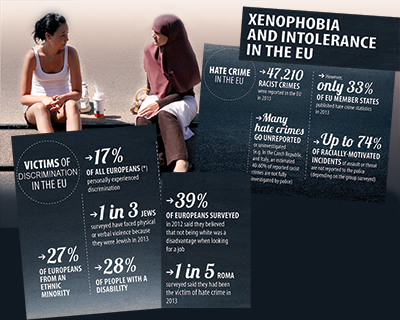 |
XENOPHOBIA XENOPHOBIA AND INTOLERANCE IN THE EU As this chart shows, racially-motivated incidents and hate crimes against ethnic minorities are quite high in number and are a big threat facing the EU today. A cultural environment based on love, respect, friendship and brotherhood, without despising those who are not from it, is a basic value that should be sustained strongly. | |
However, the real trigger behind the rise in Islamophobia is the radical terrorist groups that have emerged in the name of Islam. These radical organisations, with their perverse mind-sets, far removed from the essence of Islam, have caused a great deal of fear and hatred of Islam.
Various circles opposed to Islam have also played a stunningly effective role in planting this fear into people’s minds and this has led to a virtual cottage industry of Islamophobic talk and activities and to the emergence of a security, intelligence and industrial apparatus worth trillions of dollars. This industry is intended to prevent the rise of the Islamic world, which possesses economic and financial power centres, major energy resources and underground wealth.
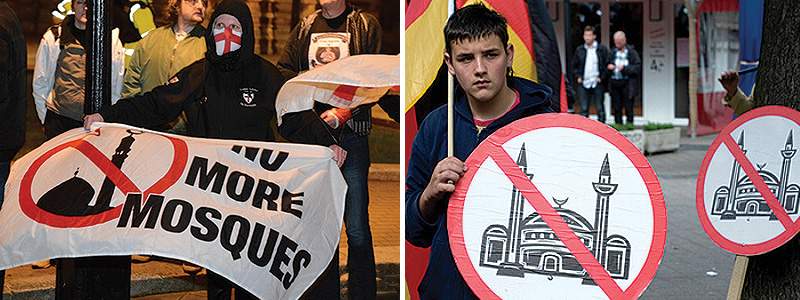 |
Islamophobia is an existing form of racism and Europe is witnessing a growing trend of it. However, the real trigger behind the rise in Islamophobia is the radical groups that have emerged in the name of Islam. These groups, far removed from the essence of Islam, have caused a great deal of fear and hatred of Islam. |
The policies adopted by Western governments, especially after September 11th, which generally targeted Muslims, and the laws passed in that context, accelerated the growth of Islamophobia. Extreme right-wing parties played a major role in encouraging opposition to Islam. These parties use Islamophobic speech to gather votes, grow strong on the back of it and target Muslim migrants in particular.
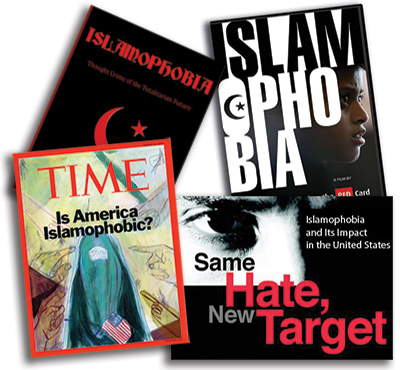 |
Muslim migrants in Europe have to strive against xenophobia as well as Islamophobia. The ethnocentric mentality that regards them as different and excludes and despises them and subjects them to both physical and psychological attacks on the grounds that migrants threaten their cultural and social lives, is on the rise in many European countries. Attacks along the lines of physical beatings, stones thrown at mosques and workplaces, the throwing of Molotov cocktails, the beating of employers and workers, swastikas and insulting slogans being written on walls, the vandalism of cemeteries, attacks on homes and families being beaten and threatened with verbal harassment, are some of the things that Muslims in Europe are frequently subjected to.
However, like all other migrants, Muslims are people who leave their own homes and seek to integrate into the countries they go to, making great economic contributions to their new societies. Discrimination and hostility toward them is wholly incompatible with human rights and modern democracy, as well as being unjust and intolerant.
However, it would be equally wrong to consider hostility toward Islam and Muslims in Europe as a single category. People who think that Muslims are taking jobs and other benefits away from Westerners, those who deliberately play on these concerns to encourage hostility toward Islam and Muslims, or those who think that increasing numbers of Muslims will eliminate Christianity and/or degenerate Western culture and those who equate Islam with terror and radicalism must all be considered separately.
 |
There is only one way of overcoming all these fears; true Muslims must describe their faith with patience and moderation and explain and show that an Islam purged of all nonsense is modern, compatible with science, democracy and logic, enlightened, progressive, opposes terror and commands love, brotherhood and peace. They must explain that Muslims have no intention of doing away with Christianity and that the Qur'an praises Christians. They must explain that the mentality equated with terrorism, slaughter and suicide attacks, that is against art, science and all beauty and that is hostile to other faiths derives not from Islam, but from deluded and badly misguided fanatics.
 |
In the Qur'an, there is no distinction between races; the Qur'an advises that people of different faiths live together in the same society in peace and happiness. A world can thus be established in which people will be able to live together in peace no matter to what race or religion they belong, in which every racist perversion will be rejected, everyone's rights will be regarded and everyone will be respected. |
The West, which boasts of the importance it attaches to democracy and human rights and how it treats all beliefs equally, also has a major responsibility: The first thing the West needs to do is introduce legal measures against Islamophobic and racist activities. Islamophobia must be regarded as a hate crime in the same way that anti-Semitism is. The West’s priority must be to develop a culture based on love, respect, friendship and brotherhood, without despising those who are not from it. Western countries, international organisations and civil society organisations must urgently demonstrate sensitivity on this subject. It is a matter of the greatest urgency in terms of world peace for new legislation to be introduced and for the public to be educated so new generations are freed of these prejudices.
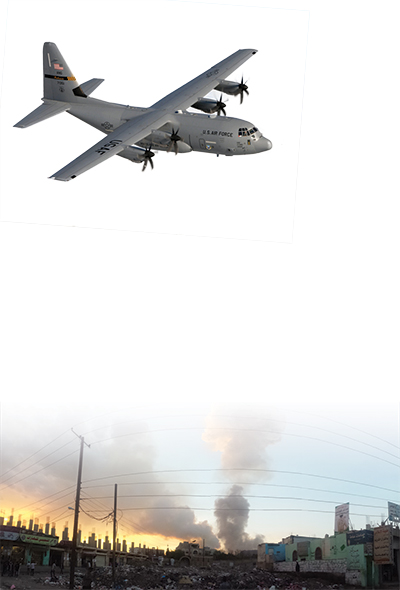 |
If we look back at history we will see that the facts do not always match fiction. Operation Eagle Claw is one example of this. The operation staged by the U.S. military in April 1980 to free the 52 U.S. citizens being held hostage in the U.S. Embassy in Iran ended in a debacle due to a sudden sandstorm. An accident during refuelling en route to the USS Nimitz, the centre of the operation, led to the destruction of a C-130 Hercules plane and a U.S. helicopter. The U.S. Army lost eight soldiers, two military planes and one transporter, and had to withdraw from the region without carrying out the operation.
Another instance took place in Somalia. An operation in 1994 under the command of Gen. William F. Garrison ended in a fiasco and the deaths of 24 Pakistani and 19 U.S. troops in fighting in Mogadishu. The U.N. peacekeeping force and U.S. troops withdrew from the region on March 3rd, 1995, in the wake of increasing losses.
The U.S. military history is full of such failed rescue operations, even if they are not always as notorious as these two. One such incident took place in mid-December, 2014, in the village of Dafaar in the Yemeni province of Abva. A rescue operation by U.S. special forces ended in two hostages, the 33-year-old American photojournalist Luke Somers and South African teacher Pierre Korkie, being shot to death by militants. A local al-Qaeda commander, various militants, a woman and a 10-year-old child also lost their lives.
Former U.S. Defense Secretary Chuck Hagel confirmed that this had happened during a hostage rescue operation. Somers and Korkie had been held hostage in Yemen for more than a year.
The U.S. had been conducting operations with drones in Yemen since 2002. Yet many of these operations ended in failure, with the deaths of many civilians. In 2014, 13 civilians died and 20 people were injured in an aerial attack on al-Qaeda targets in the Yemeni town of Rada.
So what should be done now as these countries are unable to stop the continuing terrorist activities in their lands and external military interventions are leading to the deaths of innocent people?
To reiterate, first and foremost, an intellectual struggle must be waged against terror organisations that use violence in the name of Islam. The distortions in the thinking of members of these organisations need to be explicitly stated. All leaders of opinion and politicians must emphatically state that in the Qur’an, it is explicitly stated that Muslims must invite people to the moral values of Islam simply with gentle words, not using force and compulsion. These people can be summoned to the true path only by telling them of the freedom of belief found in Islamic moral values.
All Muslims, Shiite or Sunni, must be told that violence is no way to seek their rights and that it is a flagrant violation of Islamic moral values. People need to be told that Islamic moral values cannot be espoused through acts of terror, that such acts will simply add to the numbers of the enemies of Islam and that they will invariably inflict even worse harm on Muslims.
Classes aimed at undermining the intellectual infrastructure of terror organisations need to be provided for students in schools; books and articles must be studied, and conferences and academic seminars must be held. That is the only way terrorism can be eradicated from the world. This method can dry up the swamp in which terror breeds.
Today there are radical organisations and their extensions operating in a wide range of territory from Central Asia to the Caucasus, from Africa to the Balkans, and from inside Europe to the U.S.
The only reason why radicalism is able to gather supporters from such different cultures and geographies is the education, instruction and propaganda techniques they implement on people who are mostly ignorant of religion and who approach matters emotionally, rather than with their intellect. The internet and social media are the global communication tools most commonly used by radical organisations for education and propaganda. Therefore, it is obvious that a different means against radicalism, other than the use of force and weapons, needs to be developed.
Yet the West’s most popular strategic institutions, think tanks and political advisors have failed to come up with any alternative to constantly producing new military strategies. To be more accurate, the idea that there might be an alternative to mass slaughter has never even occurred to them. They have always ignored the factors of belief and ideology in the emergence of sociological phenomena such as radicalism.
The only way of putting an end to the terror, violence and killings that stem from a distorted conception of Islam based on superstitious references, distorted interpretations and false hadiths and commandments that are totally at odds with the Qur’an is to inform the entire Islamic world of the true Islam based on the Qur’an, in the finest manner possible, and to correct those false beliefs and understandings in the light and under the guidance of the Qur’an.
All Muslims must totally reject an angry, unbending argumentative attitude which goes against the very nature of the Qur’an and in its place adopt a friendly, gentle, affectionate, calm and compassionate one. Muslims must set an example to the world and be admired for their maturity, compassion, moderation, modesty and peacefulness. Muslims must live Islam in the best possible way and introduce to the world the Islamic morality, not only in these things, but also by their achievements in the fields of science, culture, art, aesthetics and social order and others.
We are faced with a fearsome terrorism that spills rivers of blood in the Islamic world, targets civilians in the middle of Europe and the most populous locations of the USA, and threatens the whole world without any regard to religion, race or ideology. This atrocity rears its ugly head sometimes as the PKK, sometimes as Boko Haram, sometimes as Al-Qaeda, sometimes as the YPG, sometimes as Shiite militia groups and sometimes as ISIS. The terrorist organisations we see resemble the tentacles of an octopus and all of them are controlled by a single mind. They target civilians, and tear apart the Middle East while striving towards making it impossible to live in the West. They deem shedding the blood of innocents an essential method.
Among the most atrocious ones of these organisations is ISIS, which has supposedly emerged in the name of Islam but massacred the highest number of Muslims. Yet, terrorism certainly has no place in the religion of Islam as described truly in the Qur’an. The so-called Islamic references that ISIS exploits for its brutal terrorism are actually certain fabricated superstitions and bigotry infused into Islam later on but are not compliant with the Qur’an and have no relevance with the religion of Islam communicated and practiced by the Prophet Muhammad (saas).
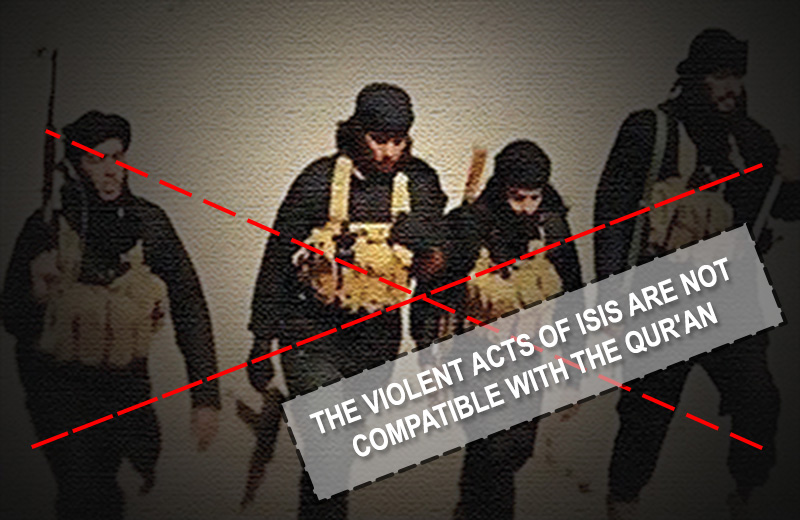 |
THE VIOLENT ACTS OF ISIS ARE NOT COMPATIBLE WITH THE QUR'AN |
The fact that "Muslim" is written on the ID cards of the terrorists and those carrying Muslim names do not make these savages, who kill innocents without remorse, Muslims. And their murders can never be dubbed "Islamic terrorism."
According to the Qur’anic moral values, a Muslim is obliged to treat other people, whether a Muslim or not, fairly and kindly, and to "forbid corruption on the earth".
"God does not love corruption." (Surat al-Baqara, 205) Killing a blameless person is one of the most flagrant examples of corruption. Killing a single person is the same as committing as big a crime as killing the entirety of humanity.
If someone kills another person – unless it is in retaliation for someone else or for causing corruption in the earth – it is as if he had murdered all mankind. And if anyone gives life to another person, it is as if he had given life to all mankind. (Surat al-Ma'ida, 32)
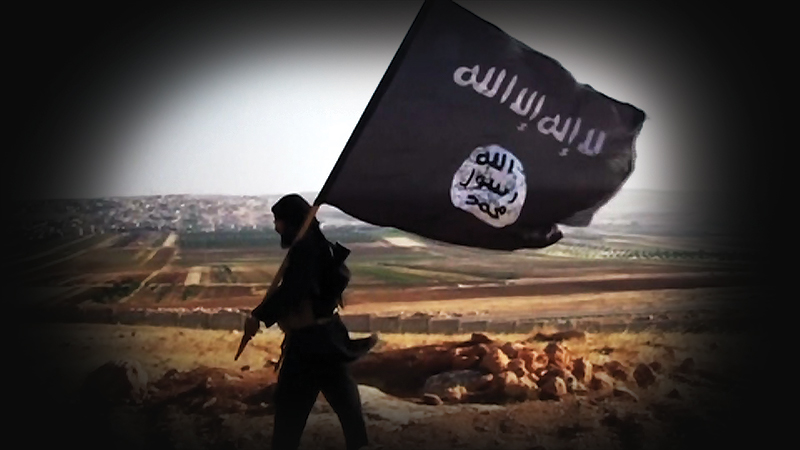 |
The Qur’an deems those who carry out massacres by using the name of Islam and calling them ‘jihad’ as murderers. No Muslim who has taken the verses of the Qur’an and the practices of our Prophet (saas) as his guide can commit such a crime.
Islam orders love, mercy and peace. On the subject of belief, Islam allows people complete liberty in a way that is precise and clear. The verses on this matter leave no room for any misinterpretation.
You have your religion and I have my religion. (Surat al-Kafirun, 6)
There is no compulsion where the religion is concerned. (Surat al-Baqara, 256)
God calls all people to adopt Islamic moral values as their model, through which mercy, compassion, understanding and peace will reign supreme over the earth:
You who have faith! Enter Islam totally. Do not follow in the footsteps of satan. (Surat al-Baqara, 208)
 |
The only way to eliminate radical terrorism is to re-establish the reign of the spirit of Qur’an in the Islamic world. Those who believe and made to believe that the solution lies in violence and terrorism should be told that;
◉ The Sunnah (sayings and teachings) of the Prophet Muhammad (saas) is the Qur’an and the Qur’an is sufficient,
◉ The Qur'an is clear and easily understandable, and that the Qur'an should be heeded rather than the interpretations of some so-called scholars,
◉ The Qur’an principally preaches forgiveness, love and mercy,
◉ There is no compulsion in Islam, and every person is free in his or her opinion and belief,
◉ The Qur’an deems murder a grave sin,
 |
◉ Muslims are under the obligation to establish and preserve peace,
◉ The Qur’an commands just treatment in all situations,
◉ Muslims should invite people to Islamic moral values only through eloquence, not through compulsion or force,
◉ And the so-called hadiths that are cited as a basis for violence are actually fabricated and false.
Raising the Islamic community's awareness through an education built upon the Qur’anic conception that calls to love and peace will take away all the means of the radicals who incite Muslims to violence.
Establishing on earth the reign of love and peace as commanded by God will irrevocably bury terrorism in the pages of history.
 |
Happiness, justice, economic well-being and welfare can only be attained through peace and unity. YES TO LOVE NO TO HATRED |
To sum up the facts we have seen so far, the faith of Islam as described in the Qur'an is a religion of peace, love and compassion. This truth is accepted by many non-Muslim historians and theologians too. One of these is the British historian Karen Armstrong, a former nun and an expert on Middle East history. In her book Holy War, which examines the history of the three Divine religions, she makes the following comments:
 |
... The word ‘Islam' comes from the same Arabic root as the word ‘peace' and the Qur'an condemns war as an abnormal state of affairs opposed to God's will… Islam does not justify a total aggressive war of extermination… Islam recognizes that war is inevitable and sometimes a positive duty in order to end oppression and suffering. The Qur'an teaches that war must be limited and be conducted in as humane a way as possible. Mohammad had to fight not only the Meccans but also the Jewish tribes in the area and Christian tribes in Syria who planned on offensive against him in alliance with the Jews. Yet this did not make Mohammed denounce the People of the Book. His Muslims were forced to defend themselves but they were not fighting a ‘holy war' against the religion of their enemies. When Mohammad sent his freedman Zaid against the Christians at the head of a Muslim army, he told them to fight in the cause of God bravely but humanely. They must not molest priests, monks and nuns nor the weak and helpless people who were unable to fight. There must be no massacre of civilians nor should they cut down a single tree nor pull down any building.3
 |
 |
The Caliphs who succeeded the Prophet Muhammad (pbuh) were also very sensitive in exercising justice. In conquered countries, both the indigenous people and the newcomers led their lives in peace and security. Abu Bakr (ra), the first Caliph, demanded his people adopt just and compassionate attitudes in these lands. All these attitudes were in compliance with the values of the Qur'an. Abu Bakr gave the following command to his army before the first Syrian expedition:
Stop, O people, that I may give you ten rules to keep by heart: Do not commit treachery, nor depart from the right path. You must not mutilate, neither kill a child or aged man or woman. Do not destroy a palm tree, nor burn it with fire and do not cut any fruitful tree. You must not slay any of the flock or herds or the camels, save for your subsistence. You are likely to pass by people who have devoted their lives to monastic services; leave them to that to which they have devoted their lives. You are likely, likewise, to find people who will present to you meals of many kinds. You may eat; but do no forget to mention the name of God.4
Omar ibn al-Khattab, who succeeded Abu Bakr, was famous for the way he exercised justice and made contracts with the indigenous people of the conquered countries. Each one of these contracts proved to be an example of compassion and justice. For instance, in his declaration granting protection to Christians in Jerusalem and Lod, he ensured that churches would not be demolished and guaranteed that Muslims would not worship in churches in groups. Omar granted the same conditions to the Christians of Bethlehem.
During the conquest of Medain, the declaration of protection given to the Nestorian Patriarch Isho'yab III (650 - 660 AD) again guaranteed that churches would not be demolished and that no building would be converted into a house or a mosque.5 The letter written by the patriarch to the bishop of Fars (Persia) after the conquest is most striking, in the sense that it depicts the understanding and compassion shown by Muslim rulers to the People of the Book in the words of a Christian:
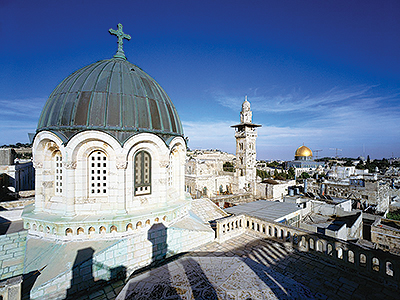 |
Jerusalem, which is sacred to Muslims, Jews and Christians, must be a place where all believers can remember God with joy and love. |
The Arabs to whom God has given at this time the government of the world... do not persecute the Christian religion. Indeed, they favour it, honour our priests and the saints of the Lord and confer benefits on churches and monasteries.6
The following document by Omar shows us the kind of understanding and concept of justice God grants to man, provided that he adopts the character traits described in the Qur'an:
This is the security which ‘Umar, the servant of God, the commander of the faithful, grants to the people of Ælia. He grants to all, whether sick or sound, security for their lives, their possessions, their churches and their crosses, and for all that concerns their religion. Their churches shall not be changed into dwelling places, nor destroyed, neither shall they nor their appurtenances be in any way diminished, nor the crosses of the inhabitants nor aught of their possessions, nor shall any constraint be put upon them in the matter of their faith, nor shall any one of them be harmed.7
All these are very important examples revealing the understanding of justice and compassion of true believers. In a verse God commands the following:
God commands you to return to their owners the things you hold on trust and, when you judge between people, to judge with justice. How excellent is what God exhorts you to do! God is All-Hearing, All-Seeing. (Qur'an, 4:58)
Canon Taylor, one of the mission leaders of the Anglican Church, expresses the beauty revealed by the Islamic morality in one of his speeches as follows:
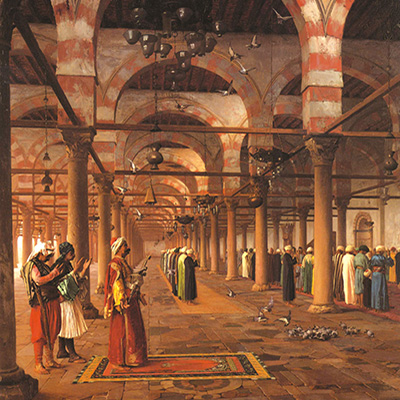 |
At the time of the Prophet Muhammad (pbuh), a just and compassionate policy was practised in relation to the People of the Book. |
It [Islam] brought out the fundamental dogmas of religion – the unity and greatness of God, that He is merciful and righteous, that He claims obedience to His will, resignation and faith. It proclaimed the responsibility of man, a future life, a day of judgment, and stern retribution to fall upon the wicked; and enforced the duties of prayer, almsgiving, fasting and benevolence. It thrust aside the artificial virtues, the religious frauds and follies, the perverted moral sentiments, and the verbal subtleties of theological disputants… It gave hope to the slave, brotherhood to mankind, and recognition to the fundamental facts of human nature.8
The false assertion that people in conquered countries converted to Islam under threat has also been disproved by Western researchers, and the justice and compassionate attitude of Muslims has been confirmed. L.Browne, a Western researcher, expresses this situation in the following words:
Incidentally these well-established facts dispose of the idea so widely fostered in Christian writings that the Muslims, wherever they went, forced people to accept Islam at the point of the sword.9
In his book The Prospects of Islam, Browne goes on to say that the real motive behind the Muslims' conquests was the brotherhood of Islam. The vast majority of Muslim administrators who have reigned over the Muslim lands throughout history continued to treat the members of other religions with the utmost compassion and respect. Within the borders of all Islamic states, both Jews and Christians lived in safety and enjoyed freedom.
The reign of the Seljuk Turks and that of the Ottoman Empire were also marked by the just and compassionate outlook of Islam. In his book, The Preaching of Islam, Thomas Arnold explains the Christians' willingness to come under Seljuk rule because of this attitude:
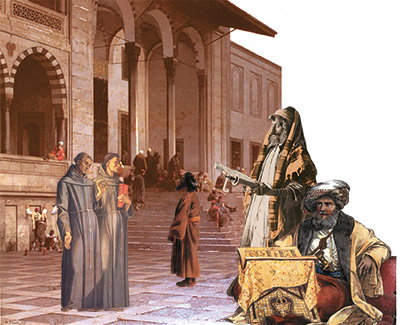 |
The Ottoman Empire, a Muslim state, granted its subjects religious freedom. Thus a peaceful multi-cultural mosaic was to be found in Ottoman lands. The state protected its citizens in accordance with Muslim moral teaching, providing for its poor no matter what religion they practised. |
This same sense of security of religious life under Muslim rule led many of the Christians of Asia Minor, also, about the same time, to welcome the advent of the Saljuq Turks as their deliverers… In the reign of Michael VIII (1261-1282), the Turks were often invited to take possession of the smaller towns in the interior of Asia Minor by the inhabitants, that they might escape from the tyranny of the empire; and both rich and poor often emigrated into Turkish dominions.10
Malik Shah, the ruler of the Islamic Seljuk Empire during its brightest age, approached the people in the conquered lands with great compassion and justice and thus was remembered with respect and love by them. All objective historians refer to the justice and compassion of Malik Shah in their works. His compassion also kindled feelings of love towards him in the hearts of the People of the Book. For this reason, unprecedented in history, many cities came under Malik Shah's rule of their own free will. Sir Thomas Arnold also mentions Odo de Diogilo, a monk of St. Denis, who participated in the Second Crusade as the private chaplain of Louis VII, refers in his memoirs to the justice administered by Muslims regardless of the subjects' religious affiliation. Based on the graphic account of Odo de Diogilo, Sir Thomas Arnold writes:
The situation of the survivors would have been utterly hopeless, had not the sight of their misery melted the hearts of the Muhammadans to pity. They tended the sick and relieved the poor and starving with open-handed liberality. Some even bought up the French money which the Greeks had got out of the pilgrims by force or cunning, and lavishly distributed it samong the needy. So great was the contrast between the kind treatment the pilgrims received from [them] . and the cruelty of their fellow-Christians, the Greeks, who imposed forced labour upon them, beat them, and robbed them of what little they had left, that many of them voluntarily embraced the faith of their deliverers. As the old chronicler [Odo de Diogilo] says: "Avoiding their co-religionists who had been so cruel to them, they went in safety among the infidels who had compassion upon them, and, as we heard, more than three thousand joined themselves to the Turks when they retired."11
These statements by historians reveal that Muslim administrators who truly adopted the morality of Islam always ruled with compassion and justice. Likewise, the history of the Ottoman Empire which ruled lands on three continents for centuries abounds with examples of justice.
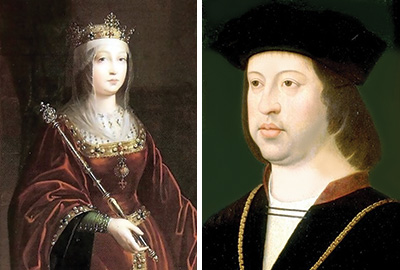 |
In 1492, the Jews who refused to convert were exiled from Spain by King Ferdinand and Queen Isabella (on the left). The Jews were accepted by the Ottoman Empire, a haven of Islamic justice and compassion. |
The way the Jews settled in Ottoman lands during the time of Sultan Beyazid II, after being subjected to massacre and exile in the Catholic kingdoms of Spain and Portugal, is a fine example of the compassion that Islamic morality brings with it. The Catholic monarchs who ruled much of Spain at the time brought grave pressure to bear on the Jews who had formerly lived in peace under Muslim rule in Andalusia. While Muslims, Christians and Jews were able to live side by side in peace in Andalusia, the Catholic monarchs tried to force the whole country to become Christian, and declared war on the Muslims while oppressing the Jews. As a result, the last Muslim ruler in the Granada region of southern Spain was overthrown in 1492. Muslims were subjected to terrible slaughter, and those Jews who refused to change their religion were sent into exile.
One group of these Jews without a homeland sought shelter in the Ottoman Empire, and the state allowed them to do so. The Ottoman fleet, under the command of Kemal Reis, brought the exiled Jews, and those Muslims who had survived the slaughter, to the land of the Ottomans.
Sultan Beyazid II has gone down in history as a most pious believer, and in the spring of 1492 he settled these Jews who had been expelled from Spain in certain parts of his empire, around Edirne, and Thessalonica in present-day Greece. Most of the 25,000 Turkish Jews living in Turkey today are the ancestors of those Spanish Jews. They practice their religion and customs, which they brought from Spain some 500 years ago and continue to live most comfortably with their own schools, hospitals, old people's homes, cultural associations and newspapers. In the same way that they have traders and businessmen, they also have representatives in numerous professions, from technical subjects to advertising, with increasingly developing intellectual circles. While Jewish communities in many countries in Europe have for centuries been exposed to the fear of anti-Semitic racist attacks, those in Turkey have lived in peace and security. This example alone is enough to demonstrate the compassion that Islam brings with it and its understanding of justice.
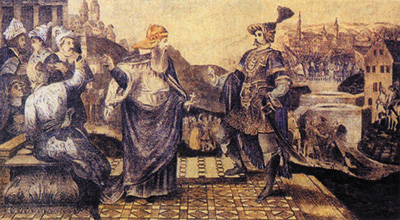 |
Sultan Mehmet the Conqueror granted many concessions to the Patriarchate. The Patriarch enjoyed autonomy for the first time in history, under Turkish rule. In the picture we see Sultan Mehmet the Conqueror receiving the Patriarch. |
The compassion and affection exhibited by Sultan Beyazid II applied to all the Ottoman sultans. When Sultan Mehmet the Conqueror conquered Istanbul, he allowed the Christians and the Jews to live freely there. André Miquel, who is known for the valuable works he has written about the just and compassionate practices of Muslims and the world of Islam, says:
The Christian communities lived under a well administered state that they did not have during the Byzantine and Latin periods. They were never subjected to systematic persecution. On the contrary, the empire and especially Istanbul had become a refuge for Spanish Jews who were tortured. People were never Islamized by force; the movements of Islamization took place as a result of social processes.12
The non-Muslims were granted many rights also in the pre-Ottoman Islamic states. Georgetown University's Professor of Religion and International Relations John L. Esposito describes how Jews and Christians who came under the administration of Muslim states met with enormous understanding:
For many non-Muslim populations in Byzantine and Persian territories already subjugated to foreign rulers, Islamic rule meant an exchange of rulers, the new ones often more flexible and tolerant, rather than a loss of independence. Many of these populations now enjoyed greater local autonomy and often paid lower taxes... Islam proved a more tolerant religion, providing greater religious freedom for Jews and indigenous Christians.13
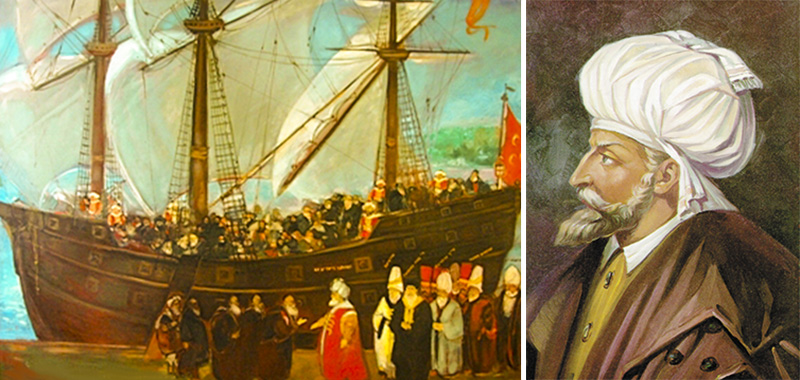 |
Sultan Beyazid II was a devout Muslim. He welcomed the Jews who were fleeing from Spanish persecution, and afforded them the freedom to practise their religion in Muslim lands. |
5. Karen Armstrong, Holy War, MacMillan London Limited, 1988, p. 25
6. W.H.C. Frend, “Christianity in the Middle East: Survey Down to A.D. 1800”, Religion in the Middle East, Ed. A.J. Arberry, I-II Cambridge, 1969, Volume I, p. 289
7. Prof. Thomas Arnold, The Spread of Islam in the World, A History of Peaceful Preaching, Goodword Books, 2001, p. 56
8. Prof. Thomas Arnold, The Spread of Islam in the World, A History of Peaceful Preaching, pp. 71-72
9. L. Browne, The Prospects of Islam, pp. 11-15
10. Prof. Thomas Arnold, The Spread of Islam in the World, A History of Peaceful Preaching, p. 96
11. Prof. Thomas Arnold, The Spread of Islam in the World, A History of Peaceful Preaching, pp. 88-89
12. André Miquel, L'Islam et sa Civilisation VIIe - XXe siècle, Librairie Armand Colin, Paris 1968, p. 244
13. John L. Esposito, The Islamic Threat: Myth or Reality, Oxford University Press, New York, 1992, p. 39